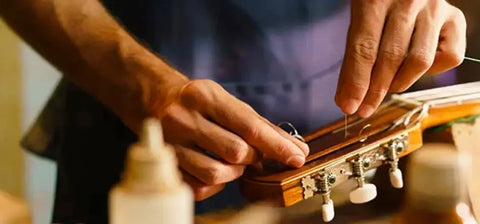Jul 02, 2024
Caring for Your Ukulele: Tips from the Experts
Introduction
Proper care and maintenance of your ukulele are essential to ensure its longevity and optimal performance. Whether you're a beginner or an experienced player, understanding how to look after your instrument will help you enjoy its beautiful sound for years to come. This comprehensive guide provides expert tips on how to care for your ukulele, from routine maintenance to handling and storage.

Daily and Routine Maintenance
1. Cleaning Your Ukulele
Regular cleaning helps maintain the appearance and sound quality of your ukulele. After each playing session, wipe down the body, neck, and strings with a soft, dry cloth to remove oils, sweat, and dirt.
Tips for Cleaning:
- Use a microfiber cloth to avoid scratching the finish.
- For deeper cleaning, slightly dampen the cloth with water or a mild guitar polish. Avoid using household cleaners, as they can damage the finish.
- Clean the fretboard periodically with a designated fretboard cleaner to remove grime and keep it smooth.
2. String Maintenance
Strings play a crucial role in the sound quality of your ukulele. Regular maintenance and timely replacement ensure your instrument sounds its best.
Tips for String Care:
- Wipe down the strings after playing to remove sweat and oils that can cause corrosion.
- Replace strings every three to six months, or when they start to sound dull or show signs of wear.
- When changing strings, remove and replace them one at a time to maintain tension on the neck and bridge.
Humidity Control
1. Importance of Humidity
Wooden instruments like ukuleles are sensitive to changes in humidity. Maintaining proper humidity levels prevents the wood from drying out and cracking or swelling due to excess moisture.
Recommended Humidity Range:
- Keep your ukulele in an environment with a humidity level of 45-55%.
2. Using a Humidifier
Humidifiers help maintain the ideal humidity levels, especially in dry climates or during winter months when indoor heating can dry out the air.
Types of Humidifiers:
- Soundhole Humidifiers: Placed inside the soundhole, these are effective and easy to use.
- Case Humidifiers: Placed inside the ukulele case, they maintain humidity while the instrument is stored.
Tips for Using Humidifiers:
- Monitor humidity levels with a hygrometer to ensure they remain within the recommended range.
- Refill and maintain the humidifier as needed to keep it functioning correctly.
Handling and Storage
1. Proper Handling
Careful handling of your ukulele prevents accidental damage and ensures its longevity.
Tips for Handling:
- Always handle your ukulele with clean, dry hands to avoid transferring oils and dirt.
- Support the neck and body when picking up or moving the instrument.
- Avoid exposing the ukulele to extreme temperatures or direct sunlight, as this can damage the wood and finish.
2. Safe Storage
Proper storage is crucial to protect your ukulele from physical damage and environmental changes.
Tips for Storage:
- Store your ukulele in a case or gig bag when not in use to protect it from dust, bumps, and temperature fluctuations.
- Use a hard case for maximum protection, especially when traveling.
- Avoid leaving your ukulele in places with extreme temperature changes, such as car trunks or near windows.
Regular Checkups and Professional Maintenance
1. Regular Checkups
Routine checkups help identify and address potential issues before they become significant problems.
What to Check:
- Action and Intonation: Ensure the string height (action) and tuning accuracy (intonation) are correct. If you notice buzzing or tuning problems, it may be time for a setup.
- Fret Wear: Inspect the frets for wear and tear. If frets are worn down, they may need leveling or replacement.
- Tuning Pegs: Ensure tuning pegs turn smoothly and hold the strings in tune.
2. Professional Maintenance
For more complex issues, seek professional help from a qualified luthier.
When to Seek Professional Help:
- Neck Adjustments: If the neck is warped or bowed, a professional can adjust it to restore proper playability.
- Fretwork: For significant fret wear or buzzing issues, a luthier can level or replace the frets.
- Cracks and Structural Damage: If you notice any cracks or significant damage to the body, neck, or bridge, take your ukulele to a professional for repair.
Conclusion
Caring for your ukulele is essential to ensure it remains in top condition and sounds its best. Regular cleaning, humidity control, proper handling, and storage, along with routine checkups and professional maintenance, will help you enjoy your ukulele for years to come. By following these expert tips, you can keep your instrument in excellent shape and continue making beautiful music.


